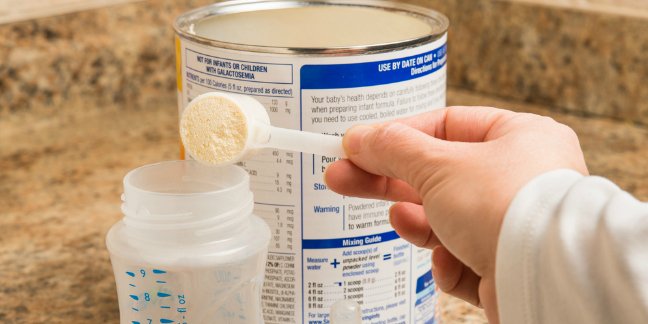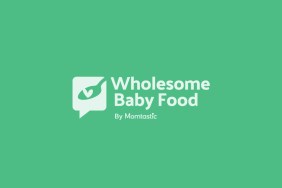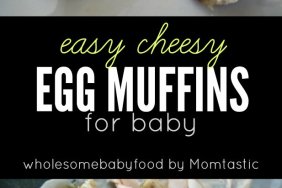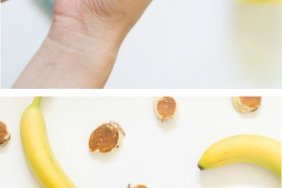Is it safe to make homemade infant formulas?
While there have been many recipes for homemade infant formulas floating around the internet, wholesomebabyfood.com will not post these recipes. I caution that you do not try to make your own homemade formula.
This caution does not mean that I or anyone associated with Wholesome Baby Food.com is “anti-formula”! Quite the opposite – for the non-breastfeeding infant (also breastfed babies are supplemented with formula and the nutritional balance of formula is important), infant formula is baby’s main source of nutrition while solid foods are not.
While burning or otherwise “messing up” a batch of sweet potatoes or applesauce would not have a severe impact on your little one’s nutrition and growth, improper mix of homemade formula might!
“Homemade formulas should not be used.” says Nick Duy, assistant to the director in FDA ‘s division of regulatory guidance. “Homemade formulas based on whole cow’s milk don’t meet all of an infant’s vitamin and mineral needs. In addition, the high protein content of cow’s milk makes it difficult for an infant to digest and may put a strain on the baby’s immature kidneys. Substituting evaporated milk for whole milk may make formula easier to digest, but it is still nutritionally inadequate when compared to commercially prepared formula. Use of soy drinks as an infant formula can actually be life-threatening (See accompanying article).“
According to the International Food Information Council:
“Consumption of homemade formulas can lead to potentially serious health consequences for babies. There is no nutritional analysis for these home recipes, and consuming improper quantities of nutrients can cause poor growth and development. Some recipes call for the use of unpasteurized or raw milk, raising the risk of the presence of E. coli, Listeria, Campylobacter spp, or Salmonella—pathogens that can cause serious health risks..”
Commercially prepared formulas are regulated by the Food and Drug Administration as a food for special dietary use.
“Infant formulas are the most heavily regulated food that there is,” says Wallingford. “cow’s milk protein that has not been cooked or processed is difficult for an infant to digest. In addition, the high protein and electrolyte (salt) content of cow’s milk may put a strain on an infant’s immature kidneys. Substituting evaporated milk for whole milk may make the homemade formula easier to digest because of the effect of processing on the protein, but the formula is still nutritionally inadequate and still may stress the kidneys.”
Substituting soy or rice milk for infant formula is not an option either. Please also keep in mind that soy “milk” is a soy based beverage. Soy beverages are NOT milk in the traditional sense and unless fortified, do not contain proper nutrients for growing infants, toddlers and children. These beverages should NEVER be confused with soy based infant formulas and should not be given in place of infant formulas. Infant formulas are nutritionally fortified, and contain the complete sets of vitamins, minerals, fats and proteins that are necessary for infants. For more information about Soy and Rice Milks
Editor’s Note:
I have had a few visitors email to say that I should include homemade formula recipe(s) and not “fearmonger” about the negatives of homemade infant formula.
It would be irresponsible of this site to make recommendations and/or offer recipes for homemade infant formula. Solid foods are known as complimentary foods because that is what they are, complimentary; they are not meant to provide for the total nutrition of an infant. Recipes for sweet potatoes and squash for example, will not endanger the overall nutritional health of your baby because your baby’s main source of nutrition is not coming from solid foods.
A homemade formula recipe could very well harm the health and growth of a baby.
During baby’s first year, infant formula is a non-breastfeeding baby’s main source of nutrition and may also be a complementary source of nutrition to a breastfed baby. We do not feel that it is wise to make homemade formula for this important reason. We will never post or endorse any recipe(s) that may endanger the health of an infant.
If you wish to make homemade baby formula for your infant, you should be aware of all the possible nutritional implications. You should consult with your pediatrician and a pediatric nutritionist. You must be absolutely certain that the homemade baby formula that you make will not endanger the health and growth of your baby.
This website is not backed by any commercial entity whatsoever. It does not receive funding from any infant formula maker or baby food maker.
Resources & Learning More:
- A History of Infant Formula
- National Academics – The Development of Infant Formulas
- FDA Infant Formula Guidelines
- Mayo Clinic – Breast-feeding vs. Formula-feeding
![]() Remember, always consult with your pediatrician regarding introducing solid foods to your baby and specifically discuss any foods that may pose allergy risks for your baby.
Remember, always consult with your pediatrician regarding introducing solid foods to your baby and specifically discuss any foods that may pose allergy risks for your baby.
![]() This site complies with the HONcode standard for trustworthy health information:
This site complies with the HONcode standard for trustworthy health information:



